University Assignment: Social Networking and Recruitment Analysis
VerifiedAdded on 2022/11/09
|6
|1758
|141
Report
AI Summary
This report delves into the ethical considerations surrounding the use of social networking sites in the recruitment process. It examines the practice of recruiters searching candidates' profiles on platforms like Facebook, Twitter, and LinkedIn, and questions whether this is an acceptable practice. The report argues against recruiters actively searching candidate profiles, emphasizing the importance of respecting candidate privacy and maintaining a separation between personal and professional lives. It discusses the candidate's right to control their online presence and the potential for misjudgment based on social media information. The report highlights the need for a balance between protecting employee information and the legitimate needs of employers, citing relevant literature and legal considerations. The key takeaway is that personal and professional lives should remain separate, and that companies should be cautious when making decisions based on social media profiles, as it could negatively affect business growth. The report references various academic sources to support its arguments, including the impact of social media on recruitment, the importance of ethical considerations, and the legal aspects of privacy in the workplace. The assignment also discusses how the candidate's online presence can be seen as a self-presentation tool and how recruiters might misjudge potential candidates. The report concludes by emphasizing the need for a balanced approach that respects candidate privacy while still allowing employers to gather relevant information.
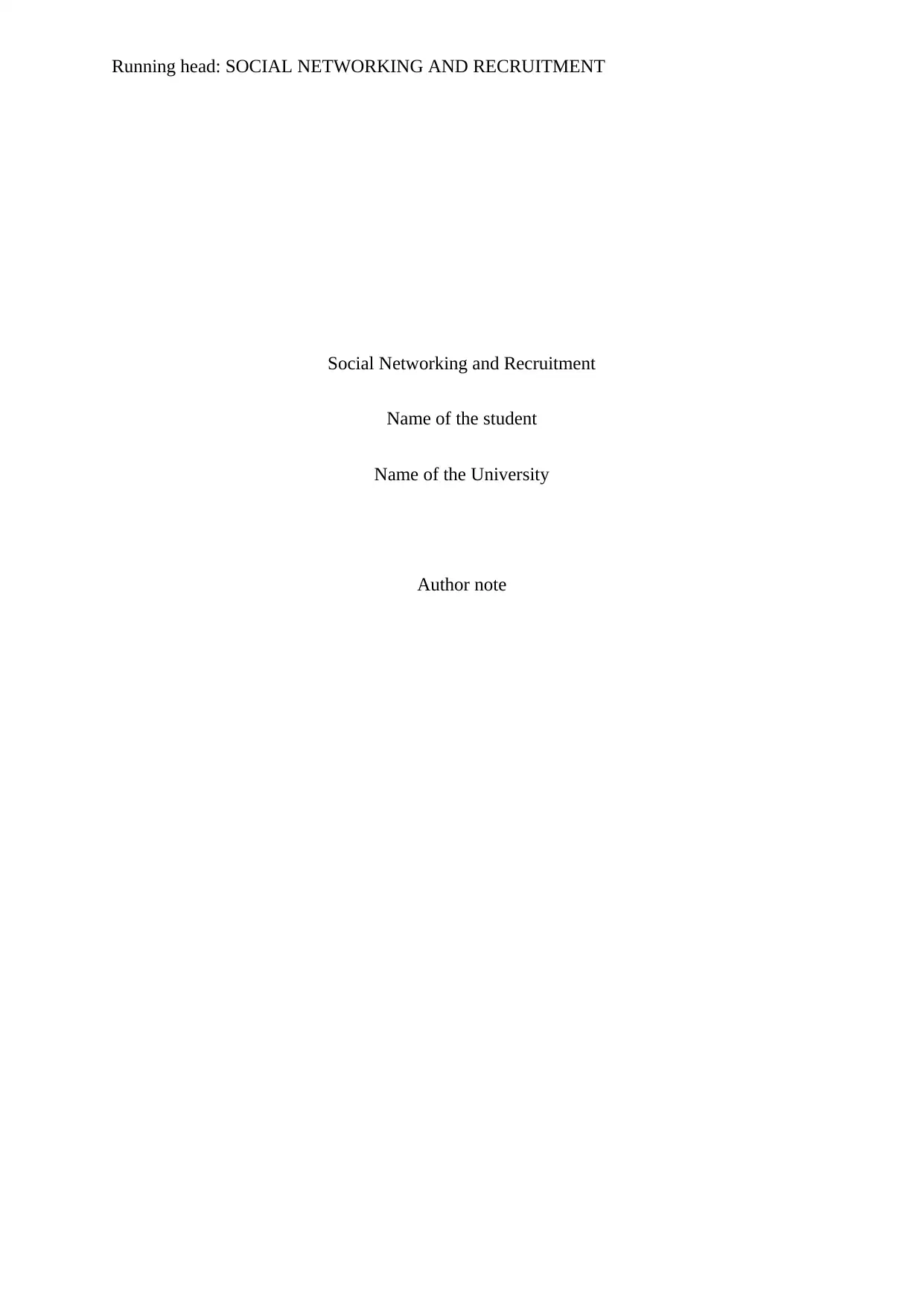
Running head: SOCIAL NETWORKING AND RECRUITMENT
Social Networking and Recruitment
Name of the student
Name of the University
Author note
Social Networking and Recruitment
Name of the student
Name of the University
Author note
Paraphrase This Document
Need a fresh take? Get an instant paraphrase of this document with our AI Paraphraser
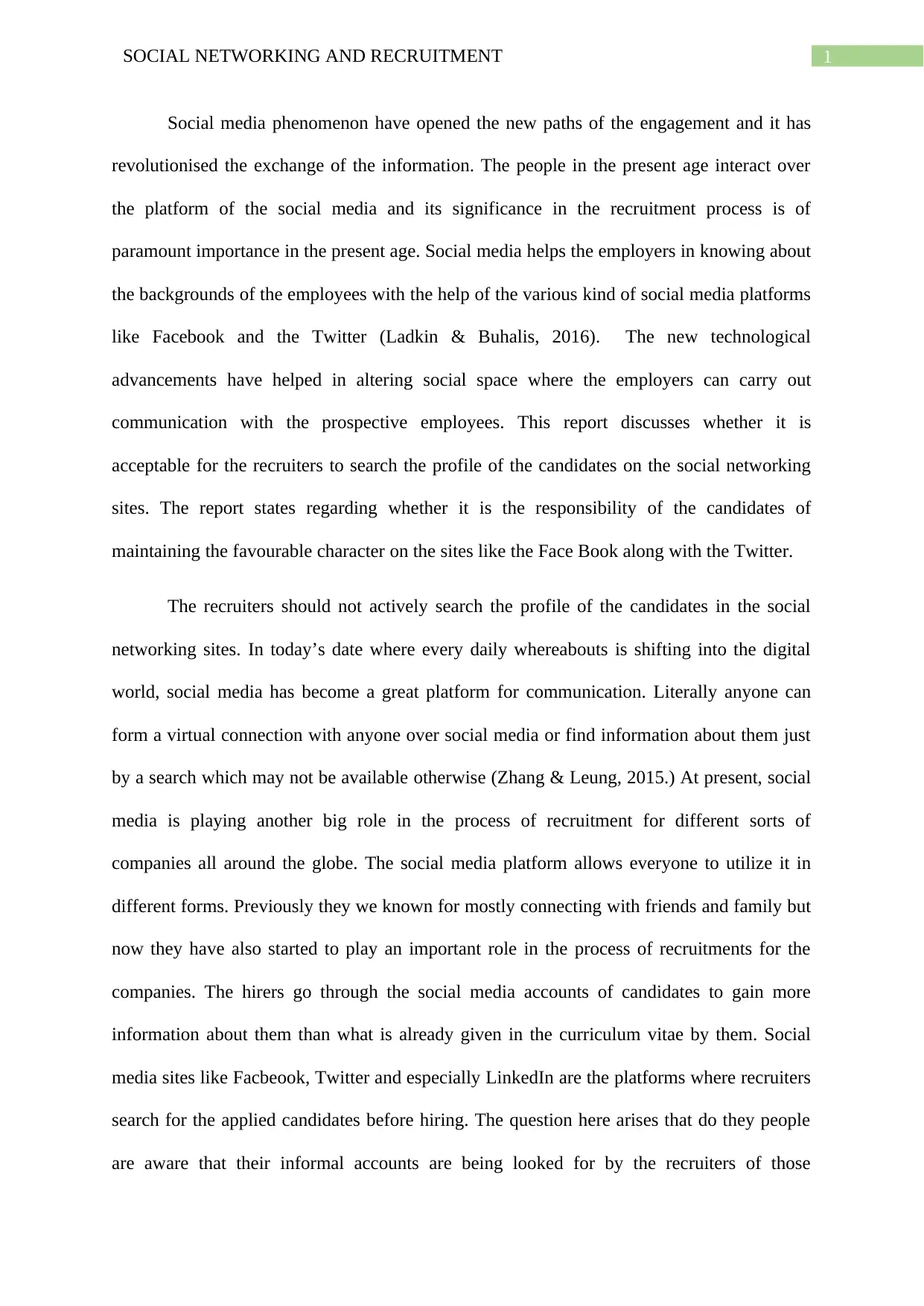
1SOCIAL NETWORKING AND RECRUITMENT
Social media phenomenon have opened the new paths of the engagement and it has
revolutionised the exchange of the information. The people in the present age interact over
the platform of the social media and its significance in the recruitment process is of
paramount importance in the present age. Social media helps the employers in knowing about
the backgrounds of the employees with the help of the various kind of social media platforms
like Facebook and the Twitter (Ladkin & Buhalis, 2016). The new technological
advancements have helped in altering social space where the employers can carry out
communication with the prospective employees. This report discusses whether it is
acceptable for the recruiters to search the profile of the candidates on the social networking
sites. The report states regarding whether it is the responsibility of the candidates of
maintaining the favourable character on the sites like the Face Book along with the Twitter.
The recruiters should not actively search the profile of the candidates in the social
networking sites. In today’s date where every daily whereabouts is shifting into the digital
world, social media has become a great platform for communication. Literally anyone can
form a virtual connection with anyone over social media or find information about them just
by a search which may not be available otherwise (Zhang & Leung, 2015.) At present, social
media is playing another big role in the process of recruitment for different sorts of
companies all around the globe. The social media platform allows everyone to utilize it in
different forms. Previously they we known for mostly connecting with friends and family but
now they have also started to play an important role in the process of recruitments for the
companies. The hirers go through the social media accounts of candidates to gain more
information about them than what is already given in the curriculum vitae by them. Social
media sites like Facbeook, Twitter and especially LinkedIn are the platforms where recruiters
search for the applied candidates before hiring. The question here arises that do they people
are aware that their informal accounts are being looked for by the recruiters of those
Social media phenomenon have opened the new paths of the engagement and it has
revolutionised the exchange of the information. The people in the present age interact over
the platform of the social media and its significance in the recruitment process is of
paramount importance in the present age. Social media helps the employers in knowing about
the backgrounds of the employees with the help of the various kind of social media platforms
like Facebook and the Twitter (Ladkin & Buhalis, 2016). The new technological
advancements have helped in altering social space where the employers can carry out
communication with the prospective employees. This report discusses whether it is
acceptable for the recruiters to search the profile of the candidates on the social networking
sites. The report states regarding whether it is the responsibility of the candidates of
maintaining the favourable character on the sites like the Face Book along with the Twitter.
The recruiters should not actively search the profile of the candidates in the social
networking sites. In today’s date where every daily whereabouts is shifting into the digital
world, social media has become a great platform for communication. Literally anyone can
form a virtual connection with anyone over social media or find information about them just
by a search which may not be available otherwise (Zhang & Leung, 2015.) At present, social
media is playing another big role in the process of recruitment for different sorts of
companies all around the globe. The social media platform allows everyone to utilize it in
different forms. Previously they we known for mostly connecting with friends and family but
now they have also started to play an important role in the process of recruitments for the
companies. The hirers go through the social media accounts of candidates to gain more
information about them than what is already given in the curriculum vitae by them. Social
media sites like Facbeook, Twitter and especially LinkedIn are the platforms where recruiters
search for the applied candidates before hiring. The question here arises that do they people
are aware that their informal accounts are being looked for by the recruiters of those
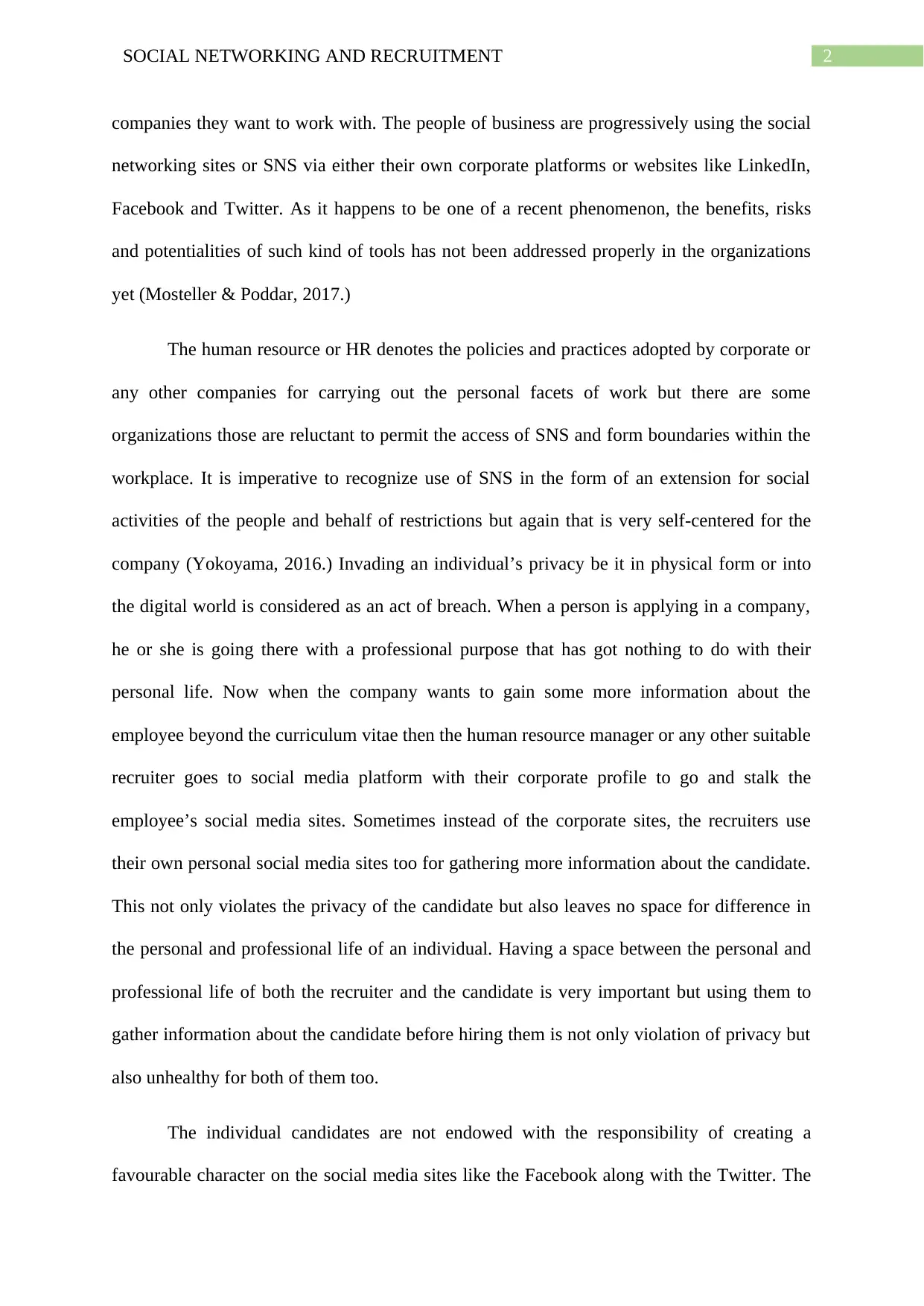
2SOCIAL NETWORKING AND RECRUITMENT
companies they want to work with. The people of business are progressively using the social
networking sites or SNS via either their own corporate platforms or websites like LinkedIn,
Facebook and Twitter. As it happens to be one of a recent phenomenon, the benefits, risks
and potentialities of such kind of tools has not been addressed properly in the organizations
yet (Mosteller & Poddar, 2017.)
The human resource or HR denotes the policies and practices adopted by corporate or
any other companies for carrying out the personal facets of work but there are some
organizations those are reluctant to permit the access of SNS and form boundaries within the
workplace. It is imperative to recognize use of SNS in the form of an extension for social
activities of the people and behalf of restrictions but again that is very self-centered for the
company (Yokoyama, 2016.) Invading an individual’s privacy be it in physical form or into
the digital world is considered as an act of breach. When a person is applying in a company,
he or she is going there with a professional purpose that has got nothing to do with their
personal life. Now when the company wants to gain some more information about the
employee beyond the curriculum vitae then the human resource manager or any other suitable
recruiter goes to social media platform with their corporate profile to go and stalk the
employee’s social media sites. Sometimes instead of the corporate sites, the recruiters use
their own personal social media sites too for gathering more information about the candidate.
This not only violates the privacy of the candidate but also leaves no space for difference in
the personal and professional life of an individual. Having a space between the personal and
professional life of both the recruiter and the candidate is very important but using them to
gather information about the candidate before hiring them is not only violation of privacy but
also unhealthy for both of them too.
The individual candidates are not endowed with the responsibility of creating a
favourable character on the social media sites like the Facebook along with the Twitter. The
companies they want to work with. The people of business are progressively using the social
networking sites or SNS via either their own corporate platforms or websites like LinkedIn,
Facebook and Twitter. As it happens to be one of a recent phenomenon, the benefits, risks
and potentialities of such kind of tools has not been addressed properly in the organizations
yet (Mosteller & Poddar, 2017.)
The human resource or HR denotes the policies and practices adopted by corporate or
any other companies for carrying out the personal facets of work but there are some
organizations those are reluctant to permit the access of SNS and form boundaries within the
workplace. It is imperative to recognize use of SNS in the form of an extension for social
activities of the people and behalf of restrictions but again that is very self-centered for the
company (Yokoyama, 2016.) Invading an individual’s privacy be it in physical form or into
the digital world is considered as an act of breach. When a person is applying in a company,
he or she is going there with a professional purpose that has got nothing to do with their
personal life. Now when the company wants to gain some more information about the
employee beyond the curriculum vitae then the human resource manager or any other suitable
recruiter goes to social media platform with their corporate profile to go and stalk the
employee’s social media sites. Sometimes instead of the corporate sites, the recruiters use
their own personal social media sites too for gathering more information about the candidate.
This not only violates the privacy of the candidate but also leaves no space for difference in
the personal and professional life of an individual. Having a space between the personal and
professional life of both the recruiter and the candidate is very important but using them to
gather information about the candidate before hiring them is not only violation of privacy but
also unhealthy for both of them too.
The individual candidates are not endowed with the responsibility of creating a
favourable character on the social media sites like the Facebook along with the Twitter. The
⊘ This is a preview!⊘
Do you want full access?
Subscribe today to unlock all pages.

Trusted by 1+ million students worldwide
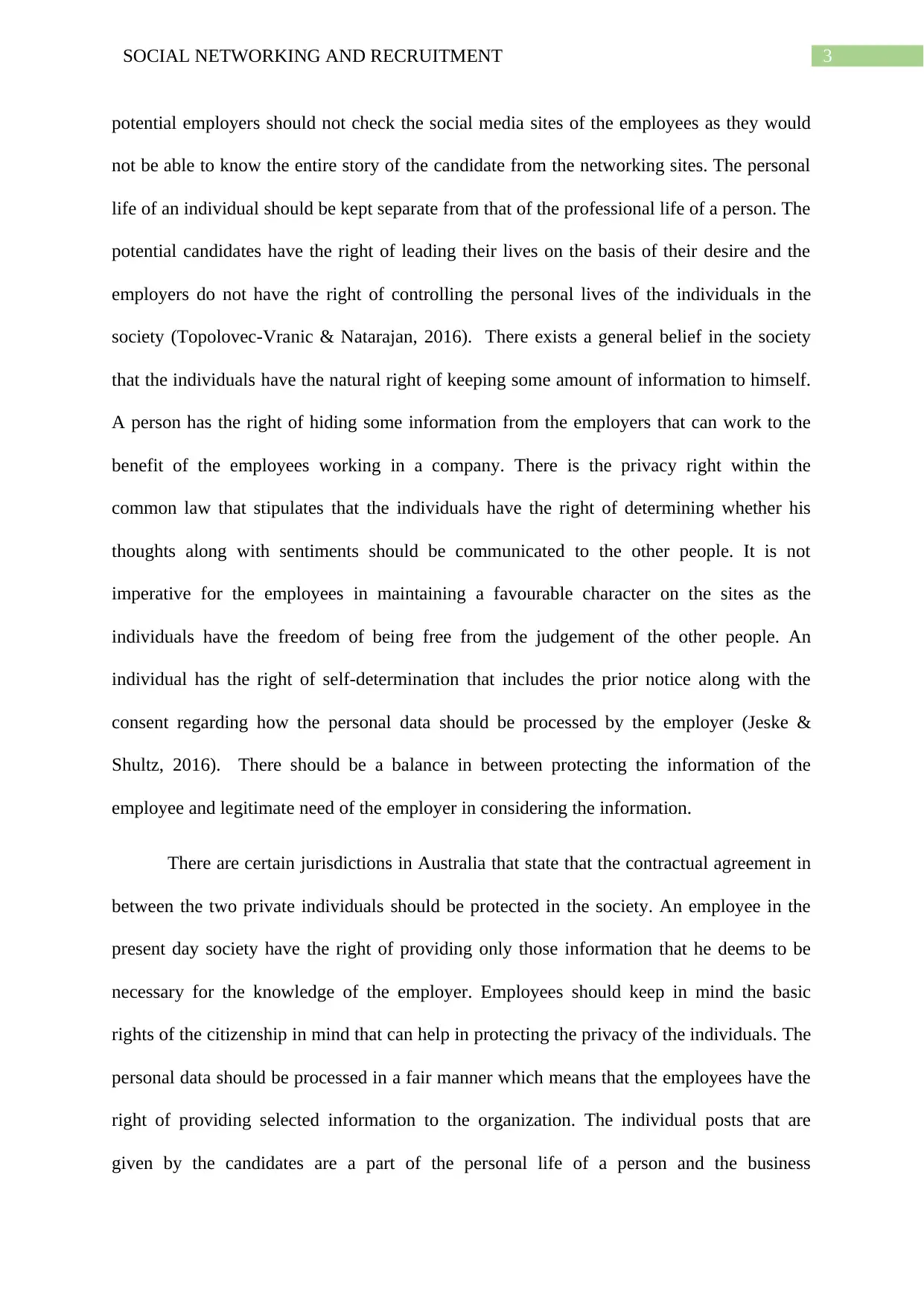
3SOCIAL NETWORKING AND RECRUITMENT
potential employers should not check the social media sites of the employees as they would
not be able to know the entire story of the candidate from the networking sites. The personal
life of an individual should be kept separate from that of the professional life of a person. The
potential candidates have the right of leading their lives on the basis of their desire and the
employers do not have the right of controlling the personal lives of the individuals in the
society (Topolovec-Vranic & Natarajan, 2016). There exists a general belief in the society
that the individuals have the natural right of keeping some amount of information to himself.
A person has the right of hiding some information from the employers that can work to the
benefit of the employees working in a company. There is the privacy right within the
common law that stipulates that the individuals have the right of determining whether his
thoughts along with sentiments should be communicated to the other people. It is not
imperative for the employees in maintaining a favourable character on the sites as the
individuals have the freedom of being free from the judgement of the other people. An
individual has the right of self-determination that includes the prior notice along with the
consent regarding how the personal data should be processed by the employer (Jeske &
Shultz, 2016). There should be a balance in between protecting the information of the
employee and legitimate need of the employer in considering the information.
There are certain jurisdictions in Australia that state that the contractual agreement in
between the two private individuals should be protected in the society. An employee in the
present day society have the right of providing only those information that he deems to be
necessary for the knowledge of the employer. Employees should keep in mind the basic
rights of the citizenship in mind that can help in protecting the privacy of the individuals. The
personal data should be processed in a fair manner which means that the employees have the
right of providing selected information to the organization. The individual posts that are
given by the candidates are a part of the personal life of a person and the business
potential employers should not check the social media sites of the employees as they would
not be able to know the entire story of the candidate from the networking sites. The personal
life of an individual should be kept separate from that of the professional life of a person. The
potential candidates have the right of leading their lives on the basis of their desire and the
employers do not have the right of controlling the personal lives of the individuals in the
society (Topolovec-Vranic & Natarajan, 2016). There exists a general belief in the society
that the individuals have the natural right of keeping some amount of information to himself.
A person has the right of hiding some information from the employers that can work to the
benefit of the employees working in a company. There is the privacy right within the
common law that stipulates that the individuals have the right of determining whether his
thoughts along with sentiments should be communicated to the other people. It is not
imperative for the employees in maintaining a favourable character on the sites as the
individuals have the freedom of being free from the judgement of the other people. An
individual has the right of self-determination that includes the prior notice along with the
consent regarding how the personal data should be processed by the employer (Jeske &
Shultz, 2016). There should be a balance in between protecting the information of the
employee and legitimate need of the employer in considering the information.
There are certain jurisdictions in Australia that state that the contractual agreement in
between the two private individuals should be protected in the society. An employee in the
present day society have the right of providing only those information that he deems to be
necessary for the knowledge of the employer. Employees should keep in mind the basic
rights of the citizenship in mind that can help in protecting the privacy of the individuals. The
personal data should be processed in a fair manner which means that the employees have the
right of providing selected information to the organization. The individual posts that are
given by the candidates are a part of the personal life of a person and the business
Paraphrase This Document
Need a fresh take? Get an instant paraphrase of this document with our AI Paraphraser
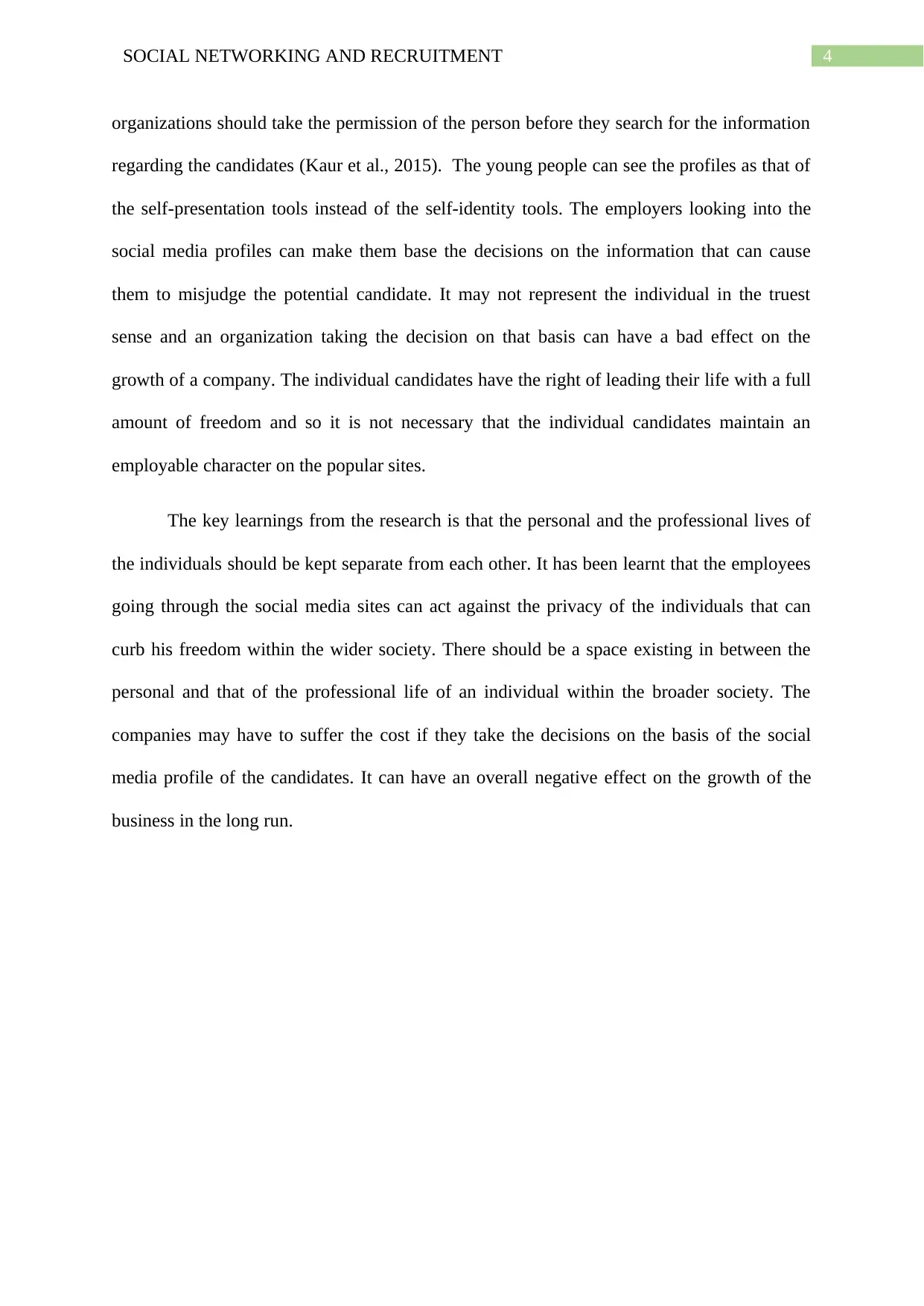
4SOCIAL NETWORKING AND RECRUITMENT
organizations should take the permission of the person before they search for the information
regarding the candidates (Kaur et al., 2015). The young people can see the profiles as that of
the self-presentation tools instead of the self-identity tools. The employers looking into the
social media profiles can make them base the decisions on the information that can cause
them to misjudge the potential candidate. It may not represent the individual in the truest
sense and an organization taking the decision on that basis can have a bad effect on the
growth of a company. The individual candidates have the right of leading their life with a full
amount of freedom and so it is not necessary that the individual candidates maintain an
employable character on the popular sites.
The key learnings from the research is that the personal and the professional lives of
the individuals should be kept separate from each other. It has been learnt that the employees
going through the social media sites can act against the privacy of the individuals that can
curb his freedom within the wider society. There should be a space existing in between the
personal and that of the professional life of an individual within the broader society. The
companies may have to suffer the cost if they take the decisions on the basis of the social
media profile of the candidates. It can have an overall negative effect on the growth of the
business in the long run.
organizations should take the permission of the person before they search for the information
regarding the candidates (Kaur et al., 2015). The young people can see the profiles as that of
the self-presentation tools instead of the self-identity tools. The employers looking into the
social media profiles can make them base the decisions on the information that can cause
them to misjudge the potential candidate. It may not represent the individual in the truest
sense and an organization taking the decision on that basis can have a bad effect on the
growth of a company. The individual candidates have the right of leading their life with a full
amount of freedom and so it is not necessary that the individual candidates maintain an
employable character on the popular sites.
The key learnings from the research is that the personal and the professional lives of
the individuals should be kept separate from each other. It has been learnt that the employees
going through the social media sites can act against the privacy of the individuals that can
curb his freedom within the wider society. There should be a space existing in between the
personal and that of the professional life of an individual within the broader society. The
companies may have to suffer the cost if they take the decisions on the basis of the social
media profile of the candidates. It can have an overall negative effect on the growth of the
business in the long run.
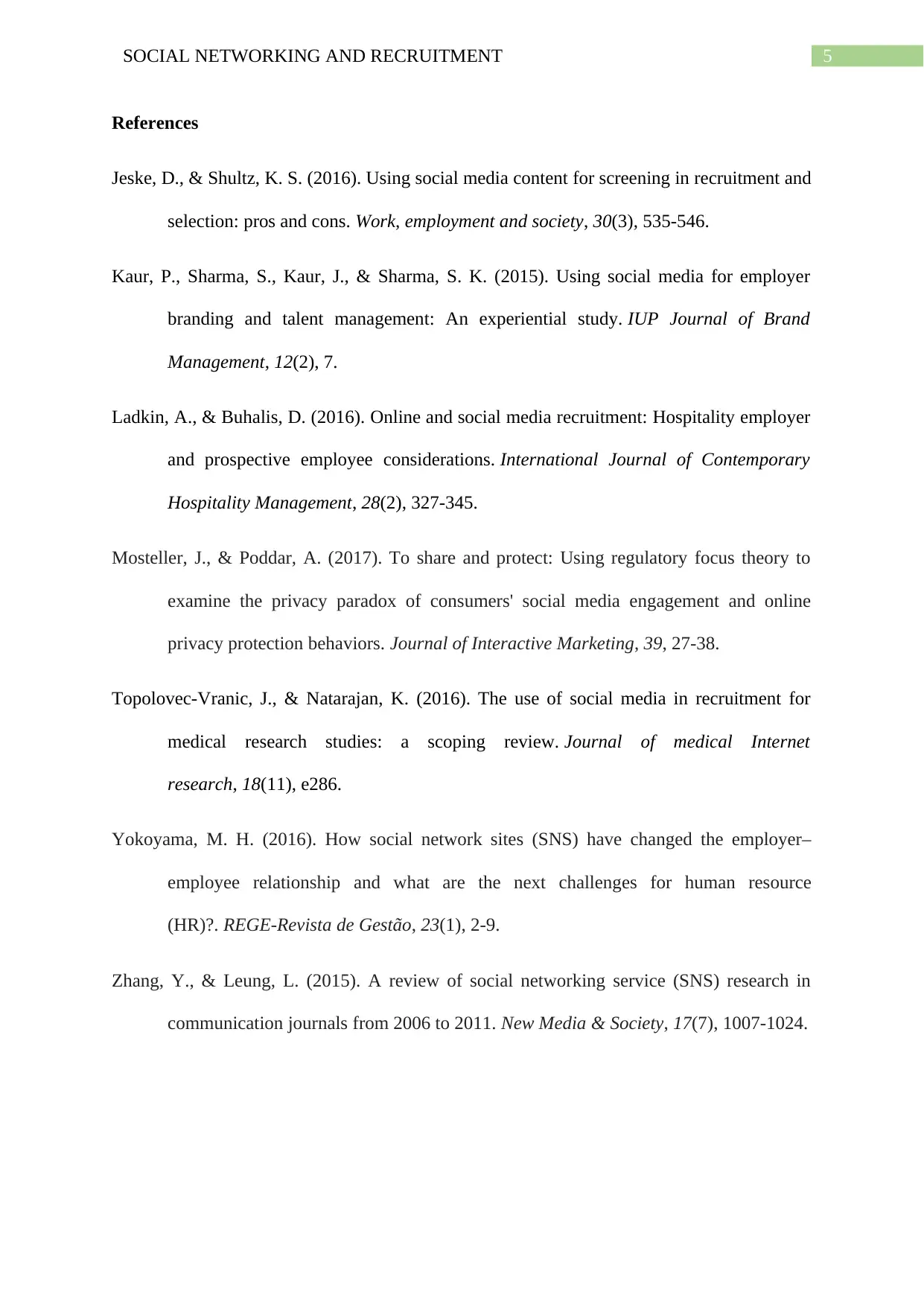
5SOCIAL NETWORKING AND RECRUITMENT
References
Jeske, D., & Shultz, K. S. (2016). Using social media content for screening in recruitment and
selection: pros and cons. Work, employment and society, 30(3), 535-546.
Kaur, P., Sharma, S., Kaur, J., & Sharma, S. K. (2015). Using social media for employer
branding and talent management: An experiential study. IUP Journal of Brand
Management, 12(2), 7.
Ladkin, A., & Buhalis, D. (2016). Online and social media recruitment: Hospitality employer
and prospective employee considerations. International Journal of Contemporary
Hospitality Management, 28(2), 327-345.
Mosteller, J., & Poddar, A. (2017). To share and protect: Using regulatory focus theory to
examine the privacy paradox of consumers' social media engagement and online
privacy protection behaviors. Journal of Interactive Marketing, 39, 27-38.
Topolovec-Vranic, J., & Natarajan, K. (2016). The use of social media in recruitment for
medical research studies: a scoping review. Journal of medical Internet
research, 18(11), e286.
Yokoyama, M. H. (2016). How social network sites (SNS) have changed the employer–
employee relationship and what are the next challenges for human resource
(HR)?. REGE-Revista de Gestão, 23(1), 2-9.
Zhang, Y., & Leung, L. (2015). A review of social networking service (SNS) research in
communication journals from 2006 to 2011. New Media & Society, 17(7), 1007-1024.
References
Jeske, D., & Shultz, K. S. (2016). Using social media content for screening in recruitment and
selection: pros and cons. Work, employment and society, 30(3), 535-546.
Kaur, P., Sharma, S., Kaur, J., & Sharma, S. K. (2015). Using social media for employer
branding and talent management: An experiential study. IUP Journal of Brand
Management, 12(2), 7.
Ladkin, A., & Buhalis, D. (2016). Online and social media recruitment: Hospitality employer
and prospective employee considerations. International Journal of Contemporary
Hospitality Management, 28(2), 327-345.
Mosteller, J., & Poddar, A. (2017). To share and protect: Using regulatory focus theory to
examine the privacy paradox of consumers' social media engagement and online
privacy protection behaviors. Journal of Interactive Marketing, 39, 27-38.
Topolovec-Vranic, J., & Natarajan, K. (2016). The use of social media in recruitment for
medical research studies: a scoping review. Journal of medical Internet
research, 18(11), e286.
Yokoyama, M. H. (2016). How social network sites (SNS) have changed the employer–
employee relationship and what are the next challenges for human resource
(HR)?. REGE-Revista de Gestão, 23(1), 2-9.
Zhang, Y., & Leung, L. (2015). A review of social networking service (SNS) research in
communication journals from 2006 to 2011. New Media & Society, 17(7), 1007-1024.
⊘ This is a preview!⊘
Do you want full access?
Subscribe today to unlock all pages.

Trusted by 1+ million students worldwide
1 out of 6
Related Documents
Your All-in-One AI-Powered Toolkit for Academic Success.
+13062052269
info@desklib.com
Available 24*7 on WhatsApp / Email
![[object Object]](/_next/static/media/star-bottom.7253800d.svg)
Unlock your academic potential
Copyright © 2020–2026 A2Z Services. All Rights Reserved. Developed and managed by ZUCOL.





